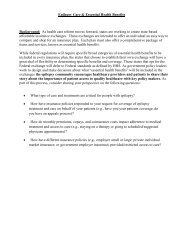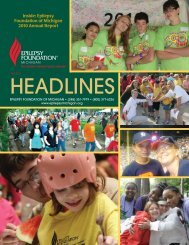Legal Rights of Children with Epilepsy in School & Child Care
Legal Rights of Children with Epilepsy in School & Child Care
Legal Rights of Children with Epilepsy in School & Child Care
You also want an ePaper? Increase the reach of your titles
YUMPU automatically turns print PDFs into web optimized ePapers that Google loves.
Selected State Laws on <strong>School</strong> Medication Adm<strong>in</strong>istration <strong>in</strong>clud<strong>in</strong>g<br />
Emergency<br />
Antiepileptic Drugs (revised 2008)<br />
State<br />
What duty does a<br />
school nurse have<br />
regard<strong>in</strong>g medication<br />
<strong>in</strong><br />
school?<br />
o<br />
Can unlicensed<br />
assistive personnel<br />
(UAP)* adm<strong>in</strong>ister<br />
medication <strong>in</strong> school?<br />
Extent <strong>of</strong><br />
Nurse’s<br />
Authority to<br />
Delegate<br />
Adm<strong>in</strong>istration<br />
<strong>of</strong> Medication<br />
Tennessee TENN. CODE ANN. § 63-7-<br />
103 (2006) states that<br />
adm<strong>in</strong>istration <strong>of</strong><br />
medication is a “practice<br />
<strong>of</strong> pr<strong>of</strong>essional nurs<strong>in</strong>g”<br />
that “requires substantial<br />
specialized judgment and<br />
skill based on knowledge<br />
<strong>of</strong> the natural, behavioral<br />
and nurs<strong>in</strong>g sciences.<br />
No, but see below. Adm<strong>in</strong>istration <strong>of</strong><br />
medications to students dur<strong>in</strong>g the<br />
school day must be performed by<br />
appropriately licensed health care<br />
pr<strong>of</strong>essionals. TENN. CODE ANN. §<br />
49-5-415 (2006).<br />
**On May 30, 2008, the Governor<br />
signed <strong>in</strong>to law a bill (HB3268)<br />
authoriz<strong>in</strong>g public and private<br />
schools to allow volunteer nonmedical<br />
school staff to adm<strong>in</strong>ister<br />
diazepam rectal gel pursuant to a<br />
student’s <strong>in</strong>dividual health plan, if<br />
a school nurse is not immediately<br />
available to adm<strong>in</strong>ister the<br />
medication. The law prohibits a<br />
school district from assign<strong>in</strong>g a<br />
student <strong>with</strong> epilepsy or other<br />
seizure disorder to a school other<br />
than the school for which the<br />
student is zoned because the<br />
student has a seizure disorder. The<br />
law provides that emergency<br />
medical services must be called<br />
whenever the medication is<br />
* In the school context, UAPs typically <strong>in</strong>clude health aides, teachers, and teachers’ aides.<br />
** Signifies a law or policy explicitly or implicitly permitt<strong>in</strong>g adm<strong>in</strong>istration <strong>of</strong> emergency antiepileptic medication by<br />
UAPs. These laws and policies are noted <strong>in</strong> bold text, along <strong>with</strong> laws and polices that expressly reference<br />
diazepam rectal gel or other rectally-adm<strong>in</strong>istered medication (<strong>in</strong>clud<strong>in</strong>g those that restrict adm<strong>in</strong>istration by<br />
UAPs).<br />
4<br />
3313.713; see OHIO ADMIN. CODE<br />
ANN. 4723-13-05 for requirements<br />
for delegat<strong>in</strong>g tasks.<br />
A state court ruled that the<br />
nurse practice act does not<br />
prohibit UAPs from<br />
adm<strong>in</strong>ister<strong>in</strong>gdiazepam.<br />
Lancaster <strong>School</strong> District<br />
Support Association v. Board <strong>of</strong><br />
Education, Lancaster City<br />
<strong>School</strong> District, No. 03 CVH 02<br />
02143 (Ohio Ct. <strong>of</strong> Common<br />
Pleas March 6, 2006), appeal<br />
dismissed based on mootness.<br />
It is considered unpr<strong>of</strong>essional<br />
conduct, unfitness, or<br />
<strong>in</strong>competency by reasons <strong>of</strong><br />
negligence, habits or other causes<br />
to “[a]ssign[] unqualified persons<br />
to perform functions <strong>of</strong> licensed<br />
persons or delegat<strong>in</strong>g nurs<strong>in</strong>g care<br />
functions and tasks and/or<br />
responsibilities to others contrary<br />
to the Nurse Practice Act or rules<br />
and regulations to the detriment <strong>of</strong><br />
patient safety.” TENN. BD. OF<br />
NURSING RULES 1000-1-.13 (1)(l)<br />
(2006).








